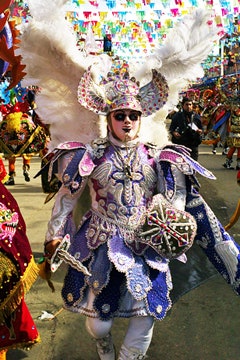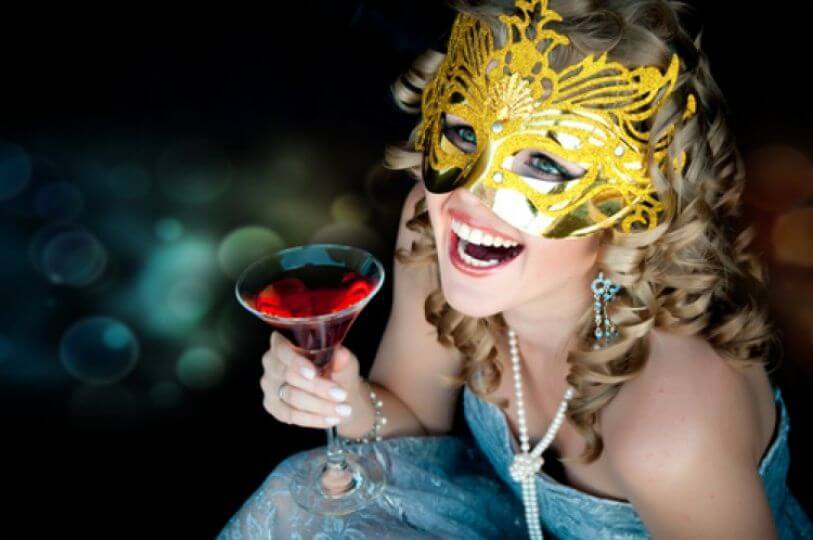
There is no holiness in the carnival!
Carnival time is the time to ward off evil forces
I saw it with my own eyes in a mountain town in Macedonia. Imagine a city with a population of several thousand people on the side of a high mountain. Old stone houses, wooden fences, a labyrinth of steep and narrow streets, garlands of peppers and tobacco drying on the porches. Several small Orthodox churches and a large square in the center, disguised people flock here from all sides - a motley, dancing crowd. There is an indescribable hustle and bustle. Musicians play in different parts of the square. A procession of several hundred dancers spins, a group of ruthlessly dirty appendages in animal masks twisting cow tails, dipping them in puddles and splashing mud on the dancers. Nobody blames them for this. Soot-stained "African" holds the bride's hand, next to him dances a shaman in a suit of long hair covered with bells. Next to him, on skewed heels, stumbles a naked cocoon in skimpy fur and fishnet stockings Kokota and a bride with bristles - all dancing men. This carnival takes place every year in the town of Vevcani in southern Macedonia on the last day of the year, which is celebrated here - according to the Orthodox calendar - on January 13, the day of St. Basil. Carnival lovers are vasiliers.
Bride and groom and condomsIt is not known how long the end of the year is celebrated in this way in Vevčany, but researchers of ancient rituals claim that it has been for several thousand years. Currently, the carnival in Vlavka is a mixture of archaic, pagan rituals, church symbols and modern pop culture. In addition to disguise using traditional masks and costumes, you can also see young men dressed as politicians known from television or ... condoms. This whole masquerade, however, has deep ritual roots. Ivanko, a young boy showing me Vevchany, explains: “The week from Christmas (January 7 in Orthodoxy) to tomorrow (January 14 is a Jordanian holiday, the memory of the Baptism of Christ) is unbaptized. time. Unclean spirits hover over us. We call them karacojoules, they shouldn't be allowed, you know? he repeats several times. The beginning of January has always been a special time in traditional cultures. It was believed that this was a time outside of God's law. All evil forces were then very close to the earth. Dozens of magical procedures were used to ward off evil and ensure well-being and health. Traces of these treats are constantly present in the carnival madness of the basilikars. Vasilikar groups (and there are probably several dozen of them in the city) should go around all the houses with the wishes of a good harvest and wealth in the new year. They have all day and all night to do it. The hosts are already waiting on the doorstep with bottles of wine and slivovitz, often during long rhymed toasts a few drops are poured onto the ground to appease harmful spirits. Every group, even if it is very modern, must have a “bride and groom” with them. Men dressed as grooms behave very depraved, not to say indecent. Their gestures symbolize fertility and harvest.
The world is upside down The disguise of debauchery sometimes gives the impression of attacks of madness. In everyday life, calm men indulge in completely wild behavior. They wallow in the mud, waving dead crows loaded with pitchforks, and clatter. These are the rules of the carnival, the established laws are suspended, all orders are turned over. The world is turned upside down. Often the most sublime things are ridiculed. One of the Basilic groups staged nothing more than the Passion of Christ: a long-haired youth wearing a crown of thorns and a white robe splattered with red paint was placed under the cross. "Jesus" addressed the crowd, and after each phrase, the singing erupted into laughter. "Jesus" said, for example, "If you want to reach the top, you must stick to the bottom", a synonym for male nature. These jokes didn't offend anyone. In the crowd of cheering spectators, I even saw Pop with his family. And I remembered the carnival customs of the Middle Ages - the Feast of Fools, on which the truths of the Christian faith were parodied and ridiculed by Christians themselves. The carnival in Vevchany proceeds like carnivals in the Middle Ages and the Renaissance. The Lenten War on Carnival by Pieter Brueghel. Evil spirits run away from the noise Everything is allowed during the carnival. But since this is also the time when the demons are close, you should be on the lookout and try to confuse them at all costs. So they show the evil spirits a crazy, deceitful world in order to deceive them. Carnival costumes and masks serve the same purpose. None of the Vassilar's faces have been revealed. They are all camouflaged, hidden so that evil cannot reveal their true nature or harm them. But the most important means to drive away evil spirits is the ubiquitous noise, each group has its own musicians. The loud sounds of huge drums and the shrill squeal of long pipes and zurli reverberate from the nearby peaks. The music never stops. In addition, each disguise has a whistle, and these are bells and bells, some hammers, tambourines, and finally, their own voice. Loud chants and screams are heard from everywhere. At every crossroads, groups of basilikars stop and dance in procession. But what! With loud kicks, deep squats, jumping half a meter up, out of breath, with muscle pain ... Don't feel sorry for yourself - dancing also has the power to chase away ghosts. And it is no coincidence that they occur at crossroads - as you know, these are favorite places for gathering evil spirits. Everything ends at dawn. The costumes are found at the spring, at the top of the mountain. They wash themselves and pop baptize the water. This is the end of the unbaptized time. Exiled spirits wander away from the earth. They won't be back for less than a year. Marta Kolasinska

Leave a Reply